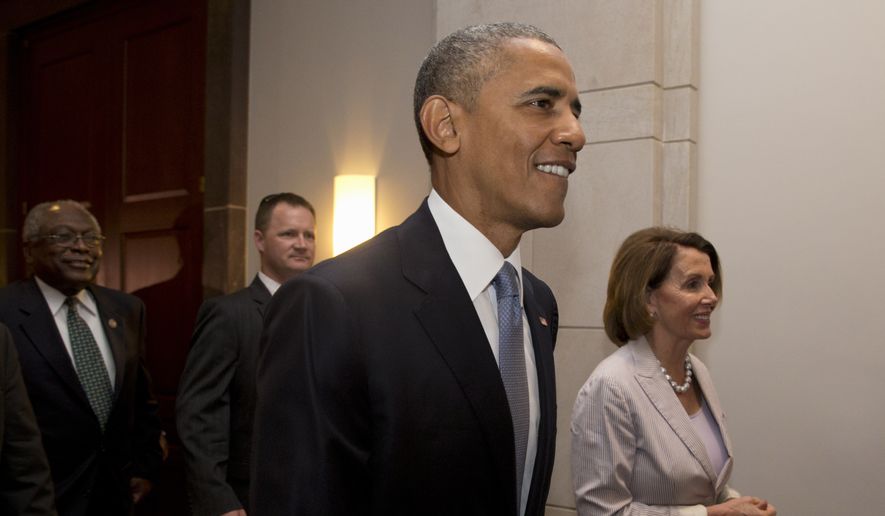House Democrats defied President Obama Friday and doomed his ambitions of a legacy-defining trade deal, undoing a carefully orchestrated chain of events that was supposed to lead to triumphant approval of fast-track trade negotiating powers.
Minority Leader Nancy Pelosi issued the final blow to Mr. Obama, taking to the floor to denounce the push for trade and saying she would kill a Democratic priority — extra assistance for workers displaced by trade agreements known as Trade Adjustment Assistance — in order to defeat the broader trade agenda.
“This is not a good deal,” she said.
A stunned White House called it a “procedural snafu” and promised to try again, and GOP leaders left the door open for a revote, but it will take a huge effort by Mr. Obama, who will need to switch votes of dozens of Democrats who defeated the trade assistance bill, 302-126.
That vote unraveled a package that was supposed to include the assistance bill, a separate measure stiffening enforcement of trade agreements and fast-track negotiating powers for Mr. Obama to complete trade agreements, which was the linchpin to the deal.
The worker assistance, known as Trade Adjustment Assistance, was supposed to pass first on the strength of Democratic votes, clearing the way for the fast-track powers, known as Trade Promotion Authority, to pass on the strength of GOP votes.
PHOTOS: See Obama's biggest White House fails
And the TPA did gain a majority, scoring a 219-211 tally — but that vote was symbolic since the worker assistance package had already failed.
“The president has some work to do,” Ways and Means Committee Chairman Paul Ryan, the GOP’s point man on free trade, told reporters after the vote.
The White House agreed, with press secretary Josh Earnest saying Mr. Obama will try to convince Democrats that worker assistance, which their party has supported overwhelmingly in the past, deserves their backing once again.
But the vote laid bare the limits of Mr. Obama’s power at the end of his tenure.
He stopped by the congressional baseball game Thursday night and traveled to the Capitol early Friday to make a personal plea for support, assuring fellow Democrats he was the liberal champion whom they’d backed before in other fights, and asking for them to trust him on trade. But most Democrats rejected his appeal, bowing to pressure from progressive campaign groups who’d said they would recruit primary challengers for any Democrat who backed part of the trade package.
“It’s a great deal for Wall Street, it’s a great deal for transnational corporations, but for Main Street and workers, it’s a punch to the gut,” said Rep. Marcy Kaptur, Ohio Democrat.
SEE ALSO: White House spins trade defeat as ‘good sign’
The White House refused to say whether Mr. Obama knew of Mrs. Pelosi’s opposition before she took the floor to denounce his push.
Mr. Earnest denied that the vote was a symbolic rejection of Mr. Obama.
“What I would concede is our work is not yet done yet,” he said.
The outcome of the vote was unclear until Mrs. Pelosi took to the floor and declared her opposition, which was a sign that she was joining the vast majority of her caucus.
But not all Democrats were on board the strategy of defeating worker assistance — a Democratic priority — in order to sink the broader trade agenda. Minutes before Mrs. Pelosi spoke, Rep. David Price, North Carolina Democrat, had called that approach “devious and reckless.”
“Play it straight,” urged Mr. Price, who voted for the worker assistance but against fast-track.
Republicans were frustrated with Mrs. Pelosi, who had refused earlier in the week to say where she stood, and who spent much of her floor speech decrying the GOP for writing in language restricting the president’s ability to negotiate global-warming terms as part of any future trade deal.
When Mrs. Pelosi began to delve into global warming, Mr. Ryan, who was sitting on the other side of the chamber, threw out his hands in frustration.
Mr. Obama had hoped to use fast-track powers to conclude negotiations on the 12-nation Trans Pacific Partnership, which would unite economies around the Pacific Rim.
Without fast-track powers, however, concluding those negotiations is virtually impossible.
• Stephen Dinan can be reached at sdinan@washingtontimes.com.




Please read our comment policy before commenting.